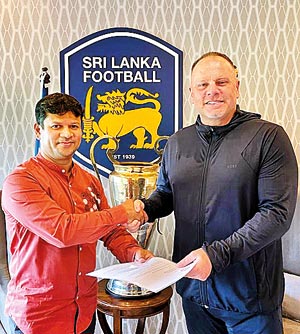FSL looking to do best for football – Jaswar

FSL President Jaswar Umar shakes hands with national coach Andy Morrison after his contract was extended for two years
Football Sri Lanka (FSL) is on the verge of adopting a professional approach to their day-to-day operations as well as other important areas such as administration, coaching, national team management and training, competitions and development. After being inactive for almost for a year, effectively after a global suspension by its world governing body, FIFA, FSL is now gradually falling back on track with activities, according to the elected President, Jaswar Umar.
“We need to be on par with the rest of the world, both administratively and competitively. When we come forward to serve the sport we all adore as stakeholders, we should do what’s best for the game and its future,” Umar stated.
The present administration of FSL, who was elected for a term of four years in accordance to the newly adopted constitution, are yet to reveal its plans and activities. Their prime task was to prepare the national men’s team for the World Cup 2026 Qualifiers, where Sri Lanka was slotted to play against Yemen, within 10 days after being duly elected.
As Umar elaborated, their first task proved to be a success despite Sri Lanka’s march came to a standstill with an aggregate score of 4-1 in favour of Yemen, a team ranked 157 globally.
“This was the first step, and we deem it as a success for the way our players handled themselves though being inactive for over one year as a team. Sri Lanka, ranked 207, did considerably well within a short preparation period, and the entire credit should go to the coaching staff and the players,” Umar said.
Sri Lanka lost the first game played in Saudi Arabia against Yemen by 0-3, but in the return fixture played in Colombo, the home team improved immensely to draw the game 1-1, a game many football experts thought Sri Lanka could have won 2-1 if not for a missed penalty kick.
With that evident progress FSL decided to extend the contract of former Manchester City defender Andy Morrison, who will now be in-charge of Sri Lanka for two more years, until end of 2025. Morrison from Scotland, who took over from Amir Alagic, tucked the players according to their best of abilities, to have Sri Lanka on the road again.
In addition to placing the national men’s team in order, to better Sri Lanka’s ranking in the FIFA listing, FSL are also on the verge of adopting new changes that would benefit the game in whole. Among the new approaches of FSL is the likelihood of recruiting a foreign national with football experience as its Chief Executive Officer (CEO), and finalising the domestic events calendar for the upcoming year.
“FSL is a sport governing body, but if we are to become better, we must adopt the new trends and changes. We need to become more professional and change our approach towards football completely unlike in the past,” he added.
During the remainder of the tenure of the present FSL administration, Umar is resolute in working towards changing the fortunes of football in Sri Lanka, for good. He further explained that development projects and programmes are afoot focusing junior and youth players, which includes school footballers, as they methodically approach the higher levels.
In addition FSL is also drafting a possible provincial competition, which may likely have the slight taste of a franchise sport league. This competition comes in addition to the remaining domestic competitions such as Premier League, Super League and FA Cup.
Plans are also being made to conduct educational programmes targeting players of all age categories and both genders, coaches, officials and administrators. By 2025, Umar and his team, which also includes Ranjith Rodrigo and Dr. Manil Fernando, intends to build a stronger men’s national team that could win back the SAFF Championship while hosting the regional competition in Sri Lanka.
“We also have an idea to build a proper football venue with all facilities that are included at any international venue. This will allow us to host international matches without spending additionally and also to have foreign countries, clubs and academies to conduct their training programmes and sessions,” Umar explained.
To have the planned projects executed, FSL has already completed fruitful discussions with the Asian Football Confederation (AFC) and several football associations. AFC and football associations of Qatar and Saudi Arabia have already pledged their consent to support Sri Lanka in this cause, while Japanese International Cooperation Agency or JICA, have showed their willingness to support with the development of junior and school football.
“FSL has a strong team of elected individuals, who are experts in their chosen fields as well as in football. By the time the tenure of the present FSL administration comes to an end, we hope to leave a better environment for whoever takes over the administration. Our goal is to overall build football and its stakeholders, which includes players, coaches, officials, administrators and leave a strong platform so Sri Lanka would be a strong contender in the Asian region and beyond,” Umar stressed.


